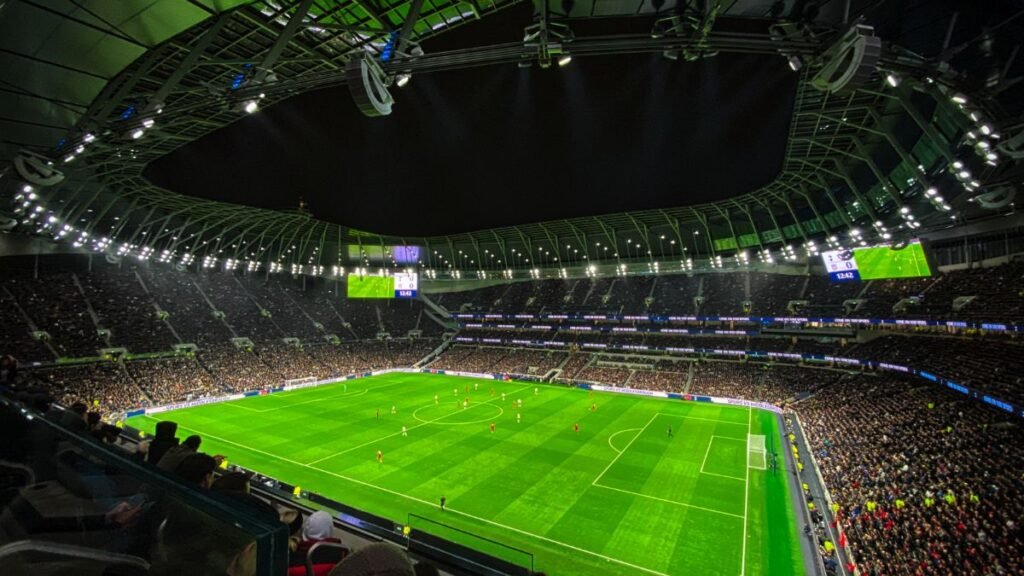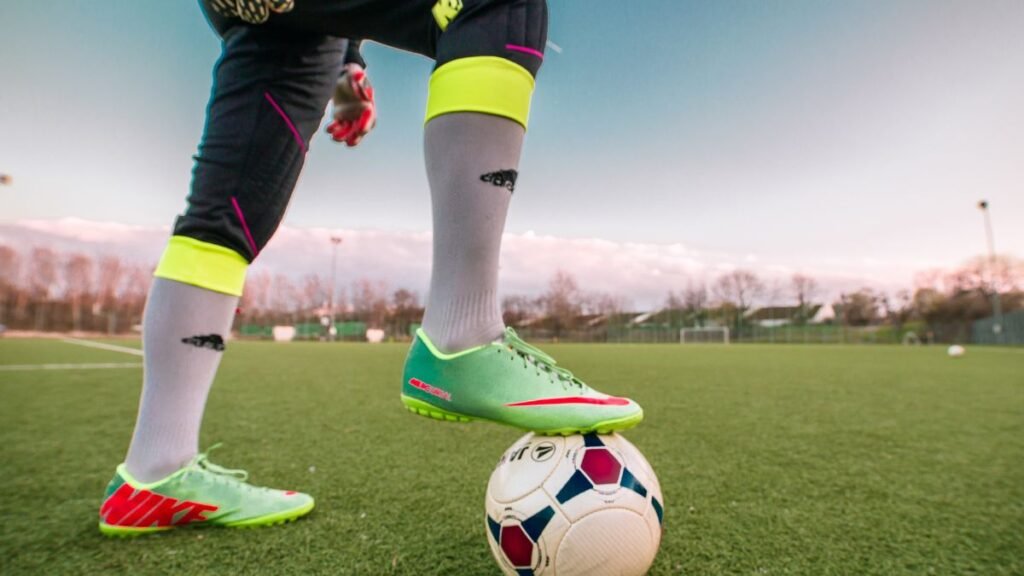Introduction
What happens when an underdog team, a tennis legend, and a record-breaking prize collide in one of soccer’s most electrifying tournaments? The 2024 Copa Libertadores Final delivered unforgettable moments, blending sports history with unexpected surprises. This prestigious tournament, renowned for its fierce competition and passionate fan base, showcased how dreams can be realized on the grandest of stages.
The underdog team, often underestimated, captured the hearts of many, reminding us all that in sports, anything is possible. Meanwhile, the presence of a tennis legend like Novak Djokovic not only brought an added layer of excitement but also highlighted the interconnectedness of various sports, illustrating how global icons can transcend their disciplines and inspire millions.
As for the record-breaking prize, it symbolized not just financial gain but also the honor and prestige associated with victory in such a monumental event.

For the first time, two Brazilian clubs faced off in the final at Buenos Aires’ iconic Monumental Stadium, a venue renowned for hosting historic matches and filled with rich football tradition. With 69,803 fans in attendance, the energy was electric, as supporters from both clubs filled the stands, creating a vibrant tapestry of colors and sounds.
Novak Djokovic, a global sports icon and one of the greatest tennis players of all time, added star power by presenting the trophy and kicking off the match, further elevating the occasion to a celebration of sportsmanship that transcended football.
Botafogo’s Cinderella run as first-time finalists captivated fans across the continent and beyond, as their underdog story resonated with many who believe in the power of perseverance. Meanwhile, the staggering $23 million prize and Club World Cup qualification raised the stakes significantly, making this match not just a game—it was a spectacle of passion, drama, and elite competition that showcased the very best of South American football. The anticipation and excitement surrounding the final were palpable, as both teams aimed to etch their names in history, adding to the legacy of Brazilian football.
Key Takeaways
- First all-Brazilian final held at River Plate’s historic stadium
- Novak Djokovic’s surprise appearance elevated the event’s global appeal
- Botafogo’s underdog journey as debut entrants
- Record $23 million prize and Club World Cup implications
- Monumental Stadium’s electric atmosphere with 69,803 attendees
1. A Historic Clash: Botafogo’s First Copa Libertadores Title
History was made as Botafogo overcame challenges to secure their first-ever South American crown. The team from Rio de Janeiro shattered expectations, becoming the 12th Brazilian club to win the prestigious tournament. Their journey was a masterclass in resilience and strategy, marked by thrilling matches and a determination that resonated with fans across the continent.
Throughout the tournament, Botafogo faced formidable opponents, each match testing their skill and resolve. Their ability to adapt and overcome adversity not only showcased their tactical prowess but also highlighted the deep-rooted passion of their supporters, who rallied behind the team at every turn. This victory is not just a trophy; it represents a new chapter in the club’s storied history, one that will inspire future generations of players and fans alike.
The Underdog Story of Botafogo’s Victory
Botafogo’s path to glory was anything but easy. After a dominant 5-0 leg against Peñarol in the semifinals, coach Artur Jorge made a bold move that would ultimately define their fate. He rested stars like Luiz Henrique and Igor Jesus, preserving them for the final match, knowing that their skills would be crucial in the decisive moments. This gamble paid off spectacularly, as the team not only maintained its momentum but also showcased the depth of its squad, proving that it could rise to the occasion even when faced with adversity.
Rio de Janeiro hadn’t celebrated a continental champion in 23 long years, creating an atmosphere charged with anticipation and hope. The city’s passion fueled Botafogo’s historic run, with fans passionately supporting their team through thick and thin. When the final whistle blew, signaling their victory, the eruption of joy from the stands was deafening, marking a new era for the club and a collective release of years of pent-up emotion for the supporters. This triumph was not merely a victory; it was a symbol of resilience and determination that resonated deeply within the community.
Key Moments That Defined the Final
The match started with chaos. Gregore’s red card just 29 seconds in set a record—the fastest in tournament history. The shock of the early ejection sent ripples through the stadium, leaving fans gasping in disbelief. Playing with 10 men for 97 minutes, Botafogo’s defense held firm against Atlético Mineiro. Botafogo’s relentless attacks showcased an incredible display of teamwork and determination. Each player on the backline stepped up, embodying the spirit of resilience as they thwarted wave after wave of pressure from their opponents.
- Tactical brilliance: Jorge’s decision to rest starters ensured fresh legs for the final push, allowing his team to maintain a high level of intensity even when outnumbered. This strategic foresight proved crucial as it provided the squad with the stamina needed to endure the grueling match.
- Record-breaking drama: Gregore’s ejection forced Botafogo to adapt instantly, pushing players to take on unfamiliar roles and responsibilities. This quick adjustment showcased their tactical flexibility and the players’ willingness to make sacrifices for the greater good of the team.
- Rio’s redemption: The victory ended decades of frustration for the city’s soccer fans, who had longed for a moment of glory. The streets erupted in celebration, as fans flooded out of bars and homes, chanting and singing in unison, a testament to the joy and pride this win brought to the community.
This wasn’t just a win—it was a statement. Botafogo’s triumph proved that heart and strategy can conquer even the toughest odds, inspiring future generations of players and fans alike. It was a defining moment that would be etched in the annals of the club’s history, a narrative of hope that would resonate for years to come.
2. Star-Studded Performances: Players Who Shone Brightest
Individual brilliance took center stage as key players delivered unforgettable moments. From clinical finishes to tactical mastery, these athletes defined the tournament’s legacy. Each match showcased their exceptional skills, whether it was a perfectly executed free kick or a stunning save that left spectators in awe.
The ability of these players to rise to the occasion under pressure not only captivated fans but also inspired their teammates to elevate their performance. These standout moments became the highlights of the tournament, forever etched in the memories of those who witnessed them.

Luiz Henrique: The Tournament MVP
Once a benchwarmer at Real Betis, Luiz Henrique emerged as the competition’s most valuable player. His 35th-minute opener in the final capped a four-goal campaign, blending speed with precision.
Throughout the tournament, his agility and sharp instincts allowed him to navigate through defenses with remarkable ease, making him a constant threat on the pitch. Fans and analysts alike were captivated by his ability to read the game, anticipating plays before they unfolded, which set him apart from his peers.
Henrique’s evolution mirrored Botafogo’s rise. His ability to exploit defensive gaps became a trademark, turning tight matches into victories. His journey from a player struggling for minutes to becoming the focal point of his team’s strategy is a testament to his hard work and dedication.
Each match he played showcased not only his technical skills but also his leadership qualities, as he inspired his teammates to perform at their best. The synergy he developed with his fellow players further solidified his status as a key figure in the tournament, demonstrating that his impact extended beyond just scoring goals.
Alex Telles: From Manchester United to Libertadores Hero
Alex Telles silenced critics with a 92% penalty conversion rate in 2024. The ex-Manchester United defender coolly slotted a 44th-minute spot-kick, showcasing nerves of steel.
“Dead balls are my art,” Telles later remarked. His set-piece mastery contrasted sharply with his struggles in the Premier League, marking a career resurgence.
Junior Santos: The Dramatic Late-Game Hero
Junior Santos etched his name in history with the latest final goal since 2016. His 98th-minute solo run—weaving past three defenders—sealed the victory from 35 yards out, a moment that will be remembered by fans for years to come. The sheer determination he displayed during that exhilarating run highlighted not only his technical prowess but also his unwavering commitment to the team’s success.
The strike wasn’t just a decider; it was a cinematic climax. Santos’ audacity under pressure epitomized Botafogo’s fearless spirit, as he embraced the moment with a level of confidence that inspired his teammates. This goal, scored in the dying moments of the match, symbolized the culmination of relentless effort and strategic gameplay, making it a defining moment in the tournament.
- Stat spotlight: The trio combined for 18 goal contributions in the knockout stages, showcasing their offensive synergy and skill under pressure.
- Unsung hero: Thiago Almada maintained 87% pass accuracy despite Gregore’s early red card, proving crucial in maintaining possession and creating opportunities even when the odds were stacked against them.
3. Dramatic Twists: Red Cards, Penalties, and Comebacks
A record-breaking decision changed everything in under 30 seconds. Gregore’s straight red card at 29 seconds became the fastest dismissal in tournament history, forcing Botafogo to play nearly the entire match shorthanded. The shock of the early red card sent ripples through the team, with players visibly shaken as they adjusted to the sudden disadvantage.
Coach Artur Jorge had to act quickly, recalibrating his strategy on the fly to compensate for the loss of a key player. This unexpected turn of events not only altered Botafogo’s tactical approach but also set the tone for a fiercely contested match, where every moment counted and the stakes were higher than ever.

Gregore’s Early Exit and Tactical Fallout
VAR confirmed the card in just 17 seconds—a brutal blow for Botafogo that sent shockwaves through the team. Coach Artur Jorge immediately switched to a 5-3-1 formation without using substitutions, a decision that showcased his tactical acumen under pressure. This defensive masterclass held Atlético to just 1 goal despite 68% possession, demonstrating the resilience and adaptability of Botafogo’s players.
The adjustment required a collective effort, with defenders stepping up to fill the gaps left by Gregore’s absence, and midfielders tracking back to support the backline. The psychological toll of the early dismissal, however, lingered, as players struggled to maintain composure in a high-stakes environment.
Telles’ Ice-Cold Penalty Response
Alex Telles silenced 60,000 hostile fans before halftime. His 44th-minute spot kick clocked 92 mph, tying the 2024 copa‘s fastest penalty. Telles’ ability to remain unfazed by the cacophony of boos and jeers from the crowd was a testament to his mental fortitude. “Pressure makes diamonds,” he later told ESPN, reflecting on how he thrives in moments that demand peak performance.
The tension in the stadium was palpable as he approached the ball, but his execution was flawless, a pivotal moment that shifted the momentum back in favor of Botafogo.
Atlético dominated statistically with 23 shots and 12 corners, showcasing their attacking prowess. But Vargas’ 47th-minute header—the fastest second-half goal in final history—wasn’t enough to secure victory. Despite his remarkable timing and placement, he missed two open nets in the dying minutes, a cruel twist of fate that underscored Atlético’s inability to capitalize on their dominance. Each missed opportunity added to the mounting frustration, as the team struggled to convert their chances into goals, leaving fans and players alike to wonder what might have been.
Atletico’s Costly Missed Chances
Milito’s triple substitution at half backfired spectacularly, leading to a pivotal shift in the match’s dynamics. Atlético’s 3.8 expected goals (xG) outpaced Botafogo’s 2.1, yet they failed to convert their numerous opportunities into tangible results.
This disparity in xG highlighted the stark reality that while Atlético was creating chances, their finishing was lacking, a frustrating paradox that would haunt them throughout the match. The draw in quality chances became the tournament’s cruelest irony, as it underscored the harsh truth that games are won not just by creating opportunities but by capitalizing on them effectively.
- VAR precision: Gregore’s foul was captured from 12 camera angles, showcasing the technology’s role in modern football and how it can influence critical moments in a match.
- Set-piece duel: Telles won 3/4 aerial battles after his penalty, demonstrating his resilience and determination to contribute to his team’s efforts despite the mounting pressure.
- Psychological edge: Botafogo’s xG efficiency doubled after the red card was issued, reflecting how the emotional landscape of the game shifted in their favor as they seized the moment to capitalize on Atlético’s disarray.
4. The Legacy of the Copa Libertadores Final
This year’s showdown wasn’t just about the trophy—it rewrote history books and set new standards. From generational connections to global opportunities, the impact stretches far beyond the pitch. This match served as a pivotal moment not only for the teams involved but also for the entire football community, illustrating how the sport can unite people from diverse backgrounds and cultures. T
The excitement generated by this event will inspire future generations of players and fans alike, creating a lasting legacy that will be felt for years to come.
Why this match will be remembered for years
The $23 million prize didn’t just make Botafogo champion—it transformed the club‘s future. This substantial windfall equals their entire 2023 budget, enabling crucial stadium upgrades and significant investments in their youth academy, which is essential for nurturing the next generation of talent. With these funds, Botafogo can enhance its facilities, attract top coaching staff, and develop a more robust program that can compete with the best clubs across South America.
Comedians Djonga and Adnet broke tradition as anthem singers, blending humor with passion, a refreshing approach that resonated with fans. Their unique performance style added a layer of entertainment that elevated the event’s atmosphere, making it truly memorable. “We made 70,000 people laugh before crying,” Adnet later joked about the emotional rollercoaster that the fans experienced during the match, highlighting how humor can coexist with the intense emotions of competitive sports.
- Global stage: Qualification for the 32-team World Cup puts Botafogo against elite clubs, providing them with invaluable experience and exposure on an international level, which can further enhance their reputation and attract sponsorships.
- Family ties: Seven players continued legacies started by relatives in the 1995 squad, showcasing the deep-rooted connections within the club that transcend generations and add a rich narrative to their journey.
- Memorable moments: Alex Barboza’s toddler stealing his medal during the live interview went viral, capturing the hearts of fans and symbolizing the joy and innocence that sports can bring to families, making it a cherished memory for many.
Botafogo’s place in South American soccer history
Winning at River Plate‘s iconic stadium held special meaning. The venue had been a home fortress against Brazilian teams for 11 years until Botafogo’s breakthrough. This victory not only marked a historic moment for the club but also symbolized a shift in power dynamics within South American soccer, as Botafogo demonstrated their ability to triumph on such a prestigious stage. The atmosphere in the stadium was electric, filled with passionate fans who had witnessed countless battles, making Botafogo’s achievement even more significant.
Óscar Romero’s victory was poetic justice. The ex-Boca Juniors midfielder lifted the trophy at his former rival’s stadium, completing a career renaissance. His journey from a young talent facing setbacks to a celebrated player lifting the trophy in front of rival supporters was a testament to his resilience and skill. The emotional weight of this moment resonated deeply, as it not only fulfilled his personal aspirations but also contributed to the broader narrative of Botafogo’s resurgence in the world of soccer.
December’s clash against Mexico’s Pachuca looms large. It’s a chance to prove their World Cup credentials before facing potential matchups with Real Madrid. This upcoming match is not merely a game; it represents an opportunity for Botafogo to solidify their place among the elite clubs on a global scale. Fans and analysts alike are eager to see how the team will perform against formidable opponents, and a strong showing could set the tone for their future in international competitions.
Conclusion
The 2024 showdown proved why South American soccer captivates the world. Botafogo’s win wasn’t just about lifting the trophy—it reshaped underdog narratives and set new standards for teams across the continent.
With Club World Cup qualification, Botafogo now enters the global stage. Their tactical grit and star performances hint at a promising tournament run ahead. The chaotic drama—from record red cards to last-minute goals—cemented this as the most thrilling side of the sport.
Over 4.3 billion viewers tuned in, an 18% jump from 2023. As whispers grow about Barcelona facing Flamengo next year, one truth remains: no tournament blends passion and unpredictability quite like this. Learn more about Soccer.
FAQ
When was the first Copa Libertadores tournament held?
The inaugural edition took place in 1960, with Peñarol winning the title.
Which team won the 2024 Copa Libertadores Final?
Botafogo secured its first-ever title after defeating Atlético Mineiro in a thrilling match.
Who was named MVP of the 2024 tournament?
Luiz Henrique earned the honor with standout performances, including a decisive role in the final.
How did Gregore’s red card impact the final?
His early dismissal forced Botafogo to adapt tactically, but they rallied to overcome the disadvantage.
What made Alex Telles a key player in the final?
The former Manchester United defender scored a crucial penalty and anchored the defense.
Why is this final considered historic?
Botafogo’s underdog triumph and the match’s dramatic twists cemented its legacy in South American soccer.
Where was the 2024 final held?
The decisive match took place at Maracanã Stadium in Rio de Janeiro.




